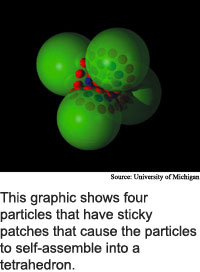
Design rules build on self-assembly
One of the challenges of making nanoscale
patterns and structures is finding ways to control how particles as small
as hundreds or tens of nanometers in diameter connect to each other. A
nanometer is one millionth of a millimeter, or the width of 10 hydrogen
atoms.
Researchers at the University of Michigan have developed computer
simulations that show that adding sticky patches of molecules that connect
to each other on a nanoparticle surface makes for building blocks that
will self-assemble into a wide range of nanostructures, including chains,
sheets, rings, shells, pyramids and staircases, depending on the position
of the sticky patches.
The simulation provides design rules for building blocks that
chemists and engineers can use to build nanostructures in the lab, and
predicts which bottom-up assembly strategies will work and which will
not, according to the researchers.
The simulation promises to speed the process of finding ways to
build practical nanostructures, including precisely-structured materials,
electronic and optical components, and chemical sensors. Quantum dots
patterned with sticky molecular patches could be made to self-assemble
into the wires and three-dimensional structures needed for quantum computer
circuits, according to the researchers.
Many research teams have found ways to interconnect nanoparticles
using molecules including DNA and proteins. The challenge in using the
researchers' design rules is figuring out how to position the molecules
on the particles.
Self-assemble arrays of patchy particles could be used in practical
applications in two to five years, according to the researchers. The work
appeared in the August 11, 2004 with issue of Nano Letters.
Atomic clock to sync handhelds
Quantum math models speech
Page layout drives Web search
Fluid chip does binary logic
Briefs:
Chip spots DNA electrochemically
Crystal structure tunes nanowires
Gas flow makes electricity
Sound makes electricity for space
Design rules build on self-assembly
Nanotube diode reverses itself

Research Watch blog
View from the High Ground Q&A
How It Works
RSS Feeds:
News
Ad links:
Buy an ad link
Ad links: Clear History
Buy an ad link
|
TRN
Newswire and Headline Feeds for Web sites
|
© Copyright Technology Research News, LLC 2000-2010. All rights reserved.